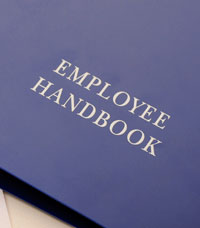 In most American workplaces, at-will employment clauses in employee handbooks and agreements are as common as break room water coolers.
In most American workplaces, at-will employment clauses in employee handbooks and agreements are as common as break room water coolers.
But recent cases brought by the National Labor Relations Board alleging that some at-will policy agreements violate federal law have employers and their attorneys on alert.
They claim that the decisions demonstrate an effort by the NLRB to flex its enforcement muscle by expanding into an area that affects both unionized and non-unionized workplaces.
“They have gotten much more aggressive,” said Margaret A. McCausland, a lawyer in Pennsylvania. “We are seeing much more of a spillover into non-union workforces with some of these rulings that we have not seen in the past.”
McCausland is advising her clients to review their employment handbooks, particularly the at-will acknowledgments, which companies typically require employees to sign upon hiring or adoption of new employee agreements.
In such acknowledgments, employees affirm that the employment relationship can be ended by either party at any time.
But recent cases brought by the NLRB have challenged language that broadly restricts the situations under which that relationship could be changed. Those rulings have employers and their attorneys concerned that they could be open to unanticipated liability.
“It’s very common to have that kind of language” in an at-will acknowledgement, said attorney Stephen W. Lyman of Indianapolis. “Because it’s so common, the recent flurry of activity by the NLRB attacking or challenging this kind of language really seems to be an attempt to change the playing field.”
At-will pacts chilling employee rights?
Two recent NLRB cases have drawn widespread attention from the employment defense bar.
American Red Cross Blood Services and Lois Hampton stemmed from an unlawful termination claim brought by an employee and the NLRB. The worker alleged that she crossed out an at-will provision in the employment handbook, which required workers to “agree that the at-will employment relationship cannot be amended, modified or altered in any way,” before signing it. Later, after several altercations with her supervisor, she was terminated.
An administrative law judge found that the policy in question violated the worker’s right to engage in concerted activity for the purpose of changing her at-will employment status, which is protected under the National Labor Relations Act.
“It is axiomatic that Section 7 of the Act gives employees the right to communicate with each other regarding their wages, hours, and working conditions,” the judge wrote in the ruling. “Further, the Board has consistently held that the communication between employees ‘for non-organizational protected activities are entitled to the same protection and privileges as organizational activities.’”
In a second case, Hyatt Hotels Group and Unite Here International Union, the union and the NLRB challenged an at-will acknowledgment that read in part:
“I understand my employment is ‘at will.’ …I acknowledge that no oral or written statements or representations regarding my employment can alter my at-will status, except for a written statement signed by me and either Hyatt’s Executive Vice-President/Chief Operating Officer or Hyatt’s President.”
The NLRB asserted that a policy violates the NLRA if an employee could reasonably interpret it as prohibiting or chilling the exercise of his or her rights under Section 7 of the act.
The case was resolved in a settlement between the parties, so it has no direct precedential effect. But the complaint demonstrated a new focus by NLRB officials on at-will policies they consider to be overly broad.
Meanwhile, in June the board launched a new page on its website focused on informing employees of their right to engage in protected concerted activity under the act, leading some employment attorneys to believe the recent rulings are part of a policy shift within the agency.
Overbroad policies and ‘self preservation’
While attorneys say that the recent NLRB actions do not suggest that at-will employment relationships are in peril, they do show that written policies and agreements that are drafted in a way that can be interpreted as overbroad could be the subject of a challenge.
But it is unclear just what the board and its regional officials consider overbroad.
“It’s hard for me to follow what the NLRB is going after,” Lyman said. “It seems to me that [the board] can pick and choose phrases out of the contract and decide that it chills employees’ right to engage in concerted activity.”
The NLRB took a similar approach with its recent actions involving the use of social media policies, he said. But despite the flurry of cases in that area, lawyers and employers were left in the dark about what kind of policy could run afoul of the NLRA in the board’s view until the board issued three lengthy reports on social media policies to give some guidance.
With at-will policies, no such guidance yet exists.
One reason for the new focus could be the changing face of America’s unionized workforce.
“Intuitively, it’s not hard to figure out that union membership is on the decline,” said Michael Anderton, who practices in Cleveland. “So potentially, the things that might be handled and processed by the board and its employees might also be on the decline. This new focus might be a little bit of self-preservation on the part of the NLRB.”
Whatever the reason behind the shift, the best defense is prevention, attorneys say. Employers who make a practice of reviewing employment handbook policies every couple of years to ensure compliance with federal law may want to consider doing so more frequently.
But even employers who do not take that step should avoid the low-maintenance approach to employee handbooks: downloading an exemplar from the Internet and simply plugging in the company name.
“I’ve always counseled my clients against that,” McCausland said. “While it has always been a bad idea, it’s especially a bad idea now.”
 New England Biz Law Update
New England Biz Law Update
